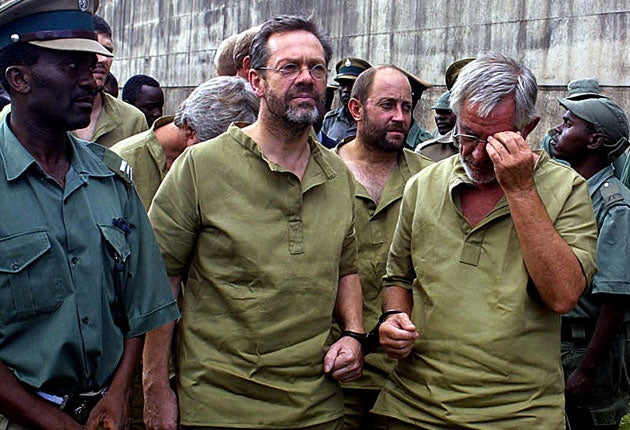Mann back in Equatorial Guinea – to work for leader he tried to oust

Simon Mann's incarceration in a brutal prison for attempting to overthrow one of the most notorious dictators in Africa was turned into an international cause célèbre in a long and vocal campaign by family friends.
The former SAS officer is now free and has just taken up his first proper "day job" since his release: working for that very same ruler he was determined to depose, Teodoro Obiang Nguema Mbasogo of Equatorial Guinea.
At the time of the bungled coup in 2004, Mr Mann is said to have declared to his friends that he was helping to deliver the people of the benighted nation from the depredations of their appalling leader, who had been accused, among other things, of being a cannibal.
Sceptics accused the Old Etonian adventurer of being much more interested in the rewards he could gain in a country which had one of the largest deposits of oil in the continent.
It remains unclear at just what point Mr Mann decided that President Obiang, who had himself come to power through a coup, was not such a bad chap after all and was someone he could do business with. There were signs pointing towards the change of heart at Mr Mann's trial, when he repeatedly attacked fellow conspirators such as Mark Thatcher, and insisted that he was being treated well in jail. After he was released from prison 33 years early (from a 34-year sentence), he insisted that he had been treated "like a guest, not a prisoner".
Since then, Mr Mann has not made any public comments, supposedly at the strong request of the Foreign Office, which helped obtain his pardon from President Obiang.
However his wife, Amanda, in an interview with Tatler magazine, described the President as a "lovely, lovely man".
This is not a view shared by the President's victims and human rights groups. Amnesty International strongly condemned the execution of four opponents three months ago following a trial it described as "a travesty".
The main opposition coalition described the executions as "political assassinations". Amnesty's Africa director, Erwin van der Borght, said: "Equatorial Guinea must put an end to the abductions, torture and executions it currently carries out under the pretence of justice."
Mr Mann has refused to say what exactly his advisory role for Mr Obiang would entail. Jeff Gordon, a private security consultant who has worked in Africa, said: "Presumably one thing Obiang does not want to seek advice from Mann on would be how to stage a coup. What Mann and his guys tried to do in Equatorial Guinea was one of the worst-kept military secrets ever. People were standing in bars in Jo'burg and Cape Town openly taking about what was going off. Few people were surprised when it ended in such a disaster."
Mr Mann and President Obiang are also said to have been liaising over a defamation case in Lebanon brought against them by Eli Calil, a businessman accused by the Equatorial Guinea regime of financing the plot to take over the oil-rich nation. Mr Calil has denied any involvement.
According to associates, Mr Mann has cultivated strong ties, in particular, with Jose Olo Obono, a former attorney-general who, while in office, brought the charges against him, along with those against many others in what have been described as political trials.
Subscribe to Independent Premium to bookmark this article
Want to bookmark your favourite articles and stories to read or reference later? Start your Independent Premium subscription today.

Join our commenting forum
Join thought-provoking conversations, follow other Independent readers and see their replies